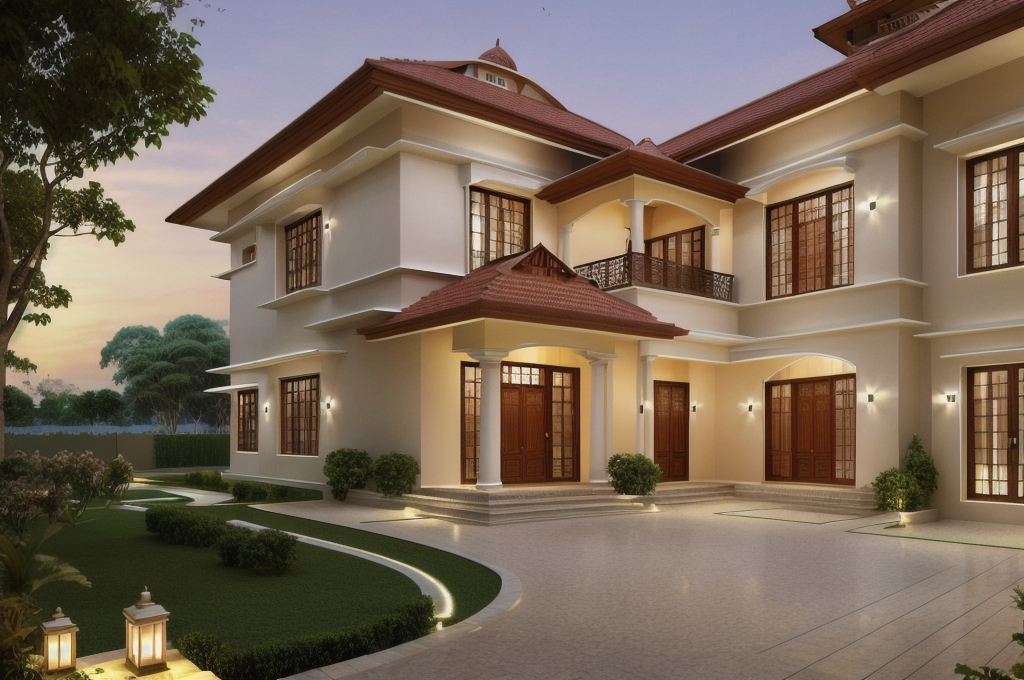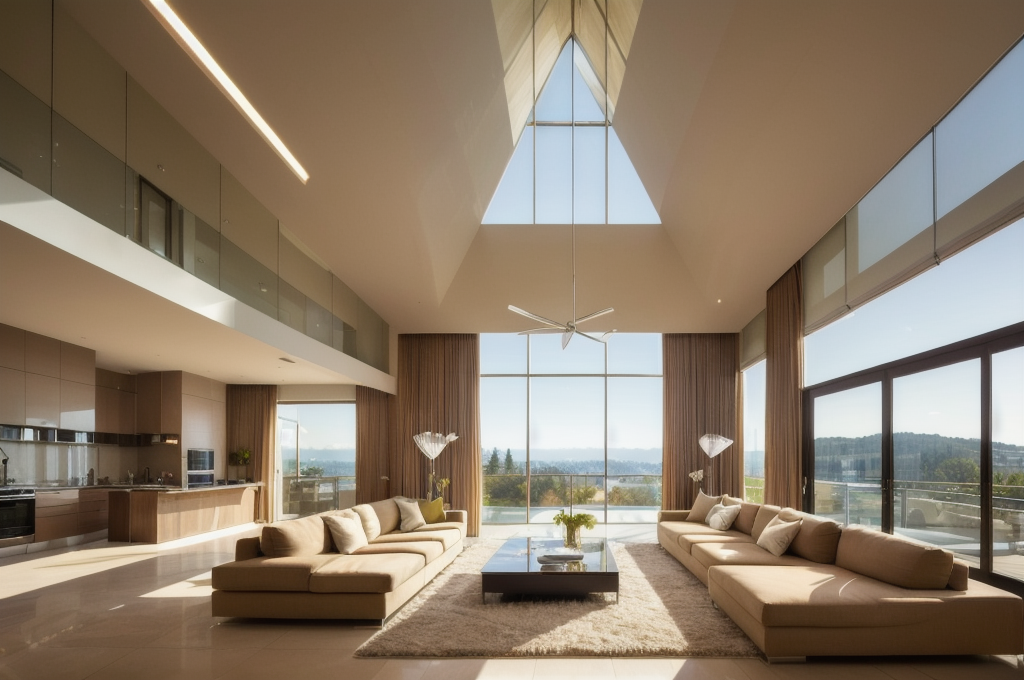Infusing Modern Homes with Traditional South Indian Architectural Elements: A Detailed Exploration

Explore South Indian House Design with features like verandah, red oxide flooring, intricate doors, earthy colors, central courtyard, swings, and Indian themed interiors.
Overview of South Indian House Design
As an aesthetic storyteller and architect, I find great joy in exploring and incorporating the rich tapestry of cultural heritage into modern designs. In my travels, interior design house photos in india, particularly South Indian styles, have stirred both fascination and inspiration. 🌏
Importance of traditional elements in modern design
The delightful intertwining of antiquity and modernity is profoundly experienced in South Indian home design. The essence of traditional elements returning to the epicenter of current design trends paves the way for vibrant, dynamic spaces that hum with life, history, culture, and timeless elegance. Red Oxide flooring, delicate, intricate wooden doors, carved wooden furniture, and an earthy color palette these signature South Indian elements breathe life into my designs and allow each space to narrate its own unique tale.🚪 🎨
Specific characteristics of South Indian homes
South Indian homes are orchestrated symphonies of age old craftsmanship and contemporary functionality. No chapter of this symphony rings as endearingly as the verandah – a cornerstone of South Indian design philosophy. Serving an essential purpose in communal living, it frames the architecture of traditional South Indian homes while lending an open, welcoming charm to modern designs.
Distinguishing features of South Indian interior design
One cannot overlook the distinctive open central courtyard, a ubiquitous feature in South Indian homes. This serene oasis fosters a deep connection with nature, allowing sunlight to dance upon the subtly painted walls while providing an outdoor retreat. Another endearing accent of South Indian interior design is the traditional swing bolstered by intricate brass supports. Envision sitting on this swing on a balmy evening, feeling the gentle breeze play upon your face… it’s just pure bliss.
Drawn from the vast reservoir of South Indian traditional ethos and propelled by my intention to break conventional barriers in design, I work to capture the inherent harmony of these elements and subtly weave them into the fabric of my design narratives. These lustrous inspirations from South India epitomize my design philosophy — not merely to create spaces, but to choreograph experiences. 🎭
Indian Themed Interiors
As a seasoned designer, I revel in expressing the unique character of India in my work. Drawing on deep cultural roots, I believe the interior design of a house in India is the embodiment of bold colors, robust materials, and evocative artifacts that narrate a compelling story of heritage.
Essence of Bold Colors and Physics in Design
Harnessing color in interior design is a testament to India’s vibrant palette. From the rich spices in bazaars to the lush landscapes of Kerala, the bold hues transcend mere aesthetics. They’re a visual symphony, representing the physics of emotions and shapes in design. 🌈
Resilience of Indigenous Materials Used
In the same vein, I have a fondness for materials sourced within India, their inherent resilience reflecting the indomitable spirit of the nation. Teak, rosewood, mango wood their durability only enhances their intrinsic beauty and functionality. These local resources contribute to the authenticity of an Indian themed interior, grounding the space in reality, yet elevating it with their natural nuances. 🌳
Representation of Culture in Traditional Indian Decor and ’Jhoola’
The cultural symbolism encompassed in the traditional Indian decor transports the onlookers to age old traditions. There’s something beautifully nostalgic about incorporating a ’jhoola’ or a swinging seat. Beyond its function as a playful element or cozy reading nook, it’s a symbol of cultural heritage, of shared stories, and a riveting charm of Indian nostalgia. 🩺
By merging the playfulness of colors, resilience of materials, and soulful culture, an Indian themed interior becomes a canvas, where every element narratively contributes to the vibrant artistry of India. The outcome is a living environment that radiates warmth, passion, and the distinctive vibrancy of Indian flair at its best.

Indian Vernacular Architecture
In my travels to the heartland India as part of my continuous exploration of the design world, I encountered the age old wisdom and beauty of Indian Vernacular Architecture. It was like taking a step back in time, each structure whispering tales of the rich history of Indian culture.
Understanding Indian Vernacular Architecture
Describing Indian vernacular architecture is akin to painting a complex tapestry of aesthetics and purpose. The essence of it lies in the profound harmony it seeks with its surrounding nature, a testament to endurance and sustainability. Each structure, whether a cottage or a palace, is constructed with locally available materials—a practice beautifully reflective of interior design in india house.
Role of Local Resources in Vernacular Architecture
What gives vernacular architecture its soul is the intimate bond between structures and the land they rise upon. Buildings are hewed from local resources, embracing elements like bamboo, mud, timber or stone. This reliance on locally available resources not only ensures an organic blend with the landscape but also reduces the carbon footprint, weaving a silent song of sustainability.
Impact of Vernacular Architecture on Local Community
The impact of vernacular architecture on the local community is deep and enduring. It’s more than just a roof overhead; it encapsulates generations of shared history and culture. And it does so, while embracing the fluid nature of dwellings, adapting to changing weather and societal needs. These age old structures are a living testament to the harmonious co existence between man and nature.
Understanding vernacular architecture allows us to appreciate the symbiotic relationship between the design and the environment, providing valuable insights we can incorporate into contemporary design practices. 🏡✨
Attractiveness of Indian Themed Interiors
Distinctiveness of Indian themed designs
Within the realm of interior design, one finds an endless sea of cookie cutter styles. Then, there are Indian themed interiors, an exotic divergent path that teems with rich colors, earthy textures, and an intriguing interplay of form and function. The furniture, simpler in structure, is usually handmade and intricately designed. If they carried a touch of interior house painting design in nigeria, it would create a diverse, cultural blend. Indian décor, with its deep rooted history, creates an ambiance that is not just visually pleasing but also emotionally resonant and full of soul.
Competitive edge provided by Indian-based interior designs
The moment your space immerses a visitor into the charisma of Indian décor, trust me, it makes a lasting impression. It’s a statement that makes your design portfolio stand out among your competitors. The gold accents intertwined with warm bold hues, tribal art forms, and traditional carvings, they all possess an unmatched charm that people are starting to fall in love with.
Increasing interest in Indian-themed interiors
More and more, design enthusiasts are gravitating toward a look that is as cozy and inviting as it is aesthetically striking. They crave the unique, the history infused, the soulful and Indian themed interiors deliver on all fronts. I’ve noticed a rising interest in such designs, a trend that doesn’t seem to be slowing down anytime soon.
If unique, historical, and soulful design speaks to the essence of who you are, give Indian themed interiors a try. You’ll find yourself appreciating old world charm with an inimitable touch of modern elegance.
Key Takeaways
In the playground of interior design, every little detail renders a story. I can still see the awe inspiring array of interior design house photos in India and the lasting impression they left. It is there that I understood the true essence of our beloved culture, reflected through the interior design of house in India. What resonated with me was not just the unique interior design in India house, but also the importance of incorporating traditional elements into modern home design. These touches of heritage not only maintain a connection to our rich history, but bring a unique character and flavor to our abodes.
Importance of Incorporating Traditional Elements in Modern Home Design
While trends come and go, there’s an undeniable charm about a house that speaks of a beautiful amalgamation of the old and new. Cousin to interior house painting design in Nigeria, these Indian elements are a gentle nod to our roots, adding a timeless elegance while keeping within the perimeter of contemporary design.
Influence and Value of Indian-Themed Interiors
The interior design of house in India, prominently featuring Indian themed interiors, remains an impactful design direction. The Indian color palette, textures, patterns—every little aspect has its unique appeal, sending a wave of warmth and welcoming energy. It’s more than just an aesthetic—it’s the feel of being at home, amid elements that replicate our culture and traditions.
Relevance of Vernacular Architecture in Understanding Cultural Significance
Design is a potent medium of storytelling, and vernacular architecture in India is no exception. This indigenous style has its roots dug deep into cultural, climatic, and technological factors, painting a vivid picture of our cultural richness. Understanding vernacular architecture is the key to truly grasping and appreciating the cultural essence of Indian interior design.
Through the scenic journey of Indian aesthetics, the essence of tradition and culture echoes in every corner. Fusing these elements with modern design practices crafts a space rich in character and history, a true visual treat worth seeking.
- Unlocking the Intricacies of Interior Design: Ranch-Style Homes and the Pursuit of Functionality
- Blending Tradition and Modernity: Exploring the Design of Nipa Hut and Trynagoal Tea House
- Enhancing Dining Experiences through Creative Interior Design and Rebranding in Burger Restaurants
- Mastering Home Renovation: The Crucial Roles of an Interior Designer and Effective Budget Management
- Understanding the Value of Interior Designers: Roles, Benefits, and Selection Process
- Exploring the Richness of Turkish Architecture and Interior Design through Adobe Stock and Pinterest
- Unveiling the Unique Characteristics and Design Elements of Ranch-Style Houses
- Embracing Openness and Personal Touch: The California Ranch House Interior Design Concept
- Embracing Warm Minimalism: The Rise of Brown Tones in Interior Design
- Enhancing Your New Home: Key Elements and Strategies in Interior Design
- Unveiling the Art of Luxury Interior Design: Exploration of Materials, Individual Style and Inspiration from Pinterest
- 13 Easy and Affordable Tips to Spruce Up Your Home Decor
- Exploring the Rich History and Distinctive Features of Tudor Architecture
- Exploring British Home Interiors: From Historical Evolution to Modern Adaptation
- Traversing the World of Interior Design: From Designer Profiles to DIY Ideas and Future-ready Furniture
- Contemporary Home Refinement: Leveraging Exposed Brick Design and Affordable, High-Quality Furnishings
- Exploring the Warmth and Charm of Modern Rustic Interior Design
- Enhancing Duplex and Triplex Interiors: An In-Depth Guide to Style, Lighting, and Effective Use of Space
- Creating Your Dream Bathroom: A Comprehensive Guide to Designs, Functionality, and Material Selection
- Creating Your Personal Spa: Insights into Modern Bathroom Design Trends



